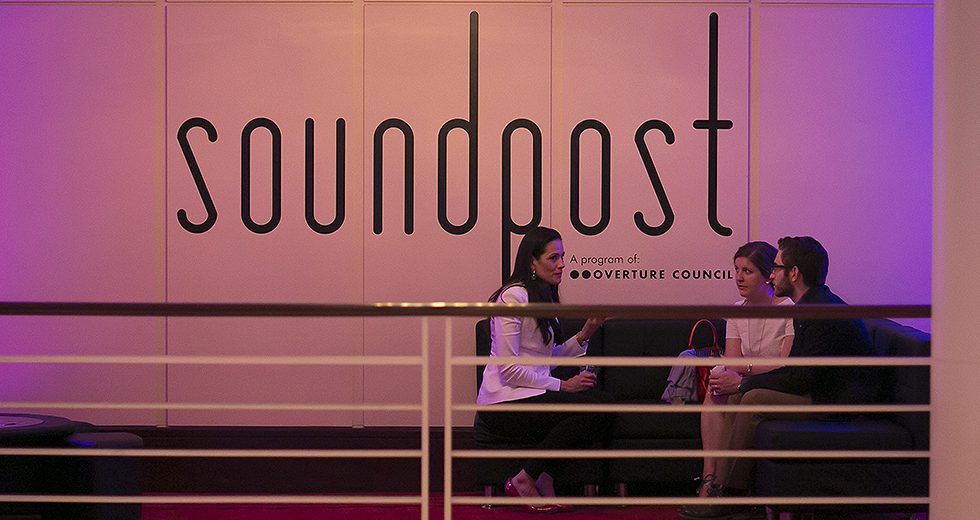
In the fall of 2007, not long after the first iPhone hit the market, the Chicago Symphony Orchestra Association senior administrators decided that they, too, were ready to start something new and transformative. CSOA’s then-President Deborah Rutter directed the development department to begin researching best practices for starting a young professionals’ group at the CSOA. Jessica Erickson and Lisa McDaniel in the donor-engagement office spent a year doing just that. After extensive online research, followed by conversations and visits with other young professional groups, “I began to write the first business plan of the Overture Council,” Erickson said. “Once complete, the business plan was approved by CSOA leadership and the CSOA Board of Trustees, and the Overture Council was officially launched.”
But why the direction from the president’s office in the first place? “The CSOA did not have a young professionals’ group at the time, though there had been one in its past,” Erickson said. “CSOA leadership knew it was important to have a place for young professionals in its family.”
And that place was intended to be more than just a few post-concert cocktails for entry-level donors in their 20s. No, this group had what at the time was a “fairly new model,” according to Erickson. “Almost all young professional groups at that time were fund-raising based. Those that didn’t have a fund-raising requirement were purely ticketing-based — offering a ticket discount to young professionals. The Overture Council was different in that it was focused on audience development and building the CSOA’s next generation of patrons, donors and leaders. The Overture Council created a place for young professionals to build and grow a lifelong relationship with the CSOA. Overture Council members became part of the CSO family.”
Around the same time, self-described “huge CSO fans” Paul Gilkerson and his friend Dan Knaus were settling in Chicago after college and “looking for young professionals’ organizations to join,” Gilkerson said. “The CSO was naturally the first place we looked, and we were shocked to discover that no such organization existed.”
But their quest was not left unfulfilled for long. Gilkerson attended a pre-launch event in March 2009 and met Erickson, McDaniel and others. “I loved their vision for the group and knew from that moment on that I wanted to be involved and support it in any way I could,” Gilkerson said. When the opportunity to serve as president of the newly launched organization came up, his reaction was, “This would be a huge honor and I will do anything in my power to try to win the job.” And he did, serving as the first president of the Overture Council for the 2009-2011 term.
That first year is etched in the memories of all involved. For Erickson, “selecting the first Overture Council executive committee [OCEC] was an incredible highlight of the first year. There was an outpouring of interest to be a part of the first OCEC. The passion and dedication of the Overture Council’s first-year members was inspiring and their energy lead the group’s development.”
That season, about 20 Overture Council members traveled to New York City to attend the CSO’s performance under Pierre Boulez at Carnegie Hall in January 2010. Gilkerson remembers that they “saw an incredible concert, and began to forge some truly lifelong friendships.”
The group has continued to grow in both membership and prestige over the years. Soundpost, the Overture Council’s signature event, was launched in 2015 and now attracts capacity attendance. Crain’s Chicago Business ran a feature article in 2016 about the success of the group.
Its importance is felt within the CSOA family. “The success of the Overture Council has meant that it quickly became part of the fabric of the Chicago Symphony Orchestra Association,” said David Chambers, CSOA vice president for development. “Since I joined the CSOA in late October [2017], I’ve been incredibly impressed by the energy, commitment and intellectual curiosity demonstrated by the membership and its [Executive Committee]. The events I’ve attended are creative, fun and stimulating. The vitality of the group is an extraordinary asset to the CSOA and the city of Chicago.”
The upcoming 2018-19 season will be the Overture Council’s tenth. The leadership is beginning its plans for celebrating this anniversary and working to position the council for another 10 years and beyond of growth and service to the Chicago Symphony Orchestra Association and the young professional community of Chicago.
TOP: Overture Council members and guests attend Soundpost, which has become a signature event for the group. | ©Todd Rosenberg Photography
Eric Rubio is a Chicago-based arts and non-profit management professional who is serving as Overture Council communications chair for the 2016-2018 term.